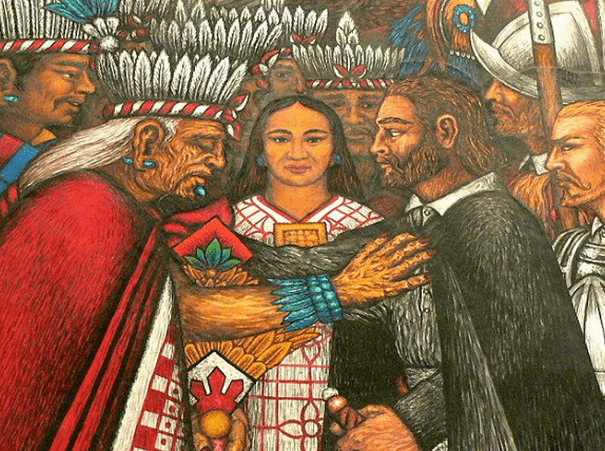Winner of the Fall 2016 StMU History Media Award for
Best Article in the Category of “People”
Best Article in the Category of “World History”
Largely due to the importation of disease and use of superior weapons, the Spaniards were able to conquer the Aztec capital of Tenochtitlan, kill the empire’s last emperor, Cuauhtémoc, and bring the Aztec empire to an end. Few know of La Malinche, the indigenous interpreter of Hernán Cortés, whose linguistic abilities were used to facilitate important conversations between the Spaniards and the indigenous leaders. Without the help of La Malinche, perhaps the Aztec empire would have survived.
Born between 1502 and 1505, La Malinche was named Malinalli Tenepal, the first part of her name being a Nahuatl term for the twelfth day of the month in correspondence to the Aztec calendar, and the second part of her name meaning “lively.” She was born of nobility in Paynala within the region of Veracruz. Her troubles started at a young age after the death of her father. La Malinche was ousted from her home to ensure her new half-brother received the inheritance of the family instead of her, since she was the eldest child. She was given to “some Indians of Xicalango.”1 Then the Indians gave her to a nobleman in Tobasco, a region in the Yucatan. When Cortés arrived to Tobasco, he was offered twenty slaves, one of them being La Malinche. Having lived in Veracruz, a Nahuatl-speaking region, and then being sold into a Maya-speaking region, La Malinche knew both languages and she was soon recognized for the linguistic talents that could benefit Cortés in his conquests.2

The few glimpses of La Malinche and how her presence as an interpreter accelerated the fall of the Aztec empire can be found in the writings of the Spanish explorers, specifically from Hernán Cortés, her “lord and master.”3 From the second letter Hernán Cortés wrote to Emperor Charles V, dated October 30, 1530, Cortés speaks of La Malinche as “a female interpreter that I had, who was a native of this country, and whom I obtained at Putunchún on the Rio Grande.”4 This confirms the vague aspects of her life that we already know. But most importantly, in this context, this letter goes on to tell of a scenario in which La Malinche saved the Spaniards from an ambush by the Cholulans. La Malinche was told by the wife of a native leader that they planned to attack the Spaniards and if La Malinche came with them, she would be protected. La Malinche delivered this message to Cortés, which ultimately led to the massacre of Cholula and provided a direct path to march towards Tenochitlan, the capital of the Aztec empire.5 This leads to the question of whether or not La Malinche was a traitor or a survivor. Did she explicitly want the Aztec empire to fall or did she just want to save herself from the carnage?
With no traces of primary sources from La Malinche herself, her story has been retold by various scholars without much consistency, nothing ever being certain. Up until the twentieth century, La Malinche was viewed as a traitor to her country Mexico. In 1861, on the celebration day of Mexico’s Independence, Ignacio “El Nigromante” Ramírez, a Mexican journalist, addressed the Mexican people by saying, “One of the mysteries of fate is that every Mexican owes his downfall and disgrace to a woman, and to another woman his salvation and glory; the myth of Eve and Mary is reproduced everywhere; we indignantly remember Cortés’s mistress and will never forget, in our gratitude to Doña María Josefa Ortiz.”6 La Malinche is seen as playing a key role in the subjugation of the Mexican peoples to Spain, while Doña María Josefa Ortiz did the contrary and liberated the country. However, many Chicana writers and modern scholars are trying to rewrite the tale of La Malinche to understand the complexities of her choices and to vindicate her. For example, Gloria Anzaldua promotes the idea that La Malinche had a “new consciousness,” that she voluntarily served as the interpreter of Cortés not only to save herself, but also because she knew that a new mestiza culture was going to be born (especially considering she had a son with Cortés in 1524).7 She made a conscious effort to exchange language and cultural aspects from each side in order to facilitate the emergence of the new mestiza society; however, with that came brutal consequences in the shape of warfare and mass death in the New World.
Whether or not La Malinche’s role as Cortés’s interpreter was traitorous, simply an effort to survive, or some other complex reason involving love for Cortés, hate for the Aztec empire for the cruelty she faced after being ousted from her home, or promotion of the new mestiza culture, no one will ever know the true story of the Indian, slave woman who traveled alongside Cortés towards the culmination of the Aztec empire.
- Bernal Castillo del Díaz, The Discovery and Conquest of Mexico, 1517-1521 rev. American ed., trans. A.P. Maudsley (New York: The Noonday Press, 1965), chap. 22-23. ↵
- Pilar Godayol, “Malintzin/ La Malinche/ Doña Marina: re-reading the myth of the treacherous translator,” Journal of Iberian and Latin American Studies 18, no. 1 (April 2012): 61-68. ↵
- Castillo del Bernal, chap 23. ↵
- Hernan Cortes to Emperor Charles V, October 30, 1520, in Letters of Despatches of Hernando Cortes, to the Emperor Charles V., trans. (New York: Wiley and Putnam, 1843), letter II. ↵
- Hernan Cortes to Emperor Charles V, October 30, 1520, in Letters of Despatches of Hernando Cortes, to the Emperor Charles V, letter II. ↵
- Rosario Pérez-Lagunes, “The Myth of La Malinche: From the Chronicles to Modern Mexican Theater” (PhD dis., Virginia Polytechnic Institute and State University, 2001), 24. Although she was of Spanish descent, Doña María Josefa Ortiz was born in Valladolid, Mexico in 1768 and identified herself as Mexican. She and her husband were both a part of the rebellion that ultimately led to Mexico’s independence from Spain in 1824. ↵
- Godayol, 68-70. ↵



230 comments
Sebastian Castro Ramos
Interesting Article! Never before had I heard about La Malinche and her story about treason to the Mexican people. I imagined Cortes should have had some kind of interpreter when conquering Mexico, but I wouldn’t have thought the interpreter would have such an impact on the conquest of the Aztec empire. I think the reason for her acts might be on the lines of the mestizo culture and love for Cortes.
Erin Vento
Before this article, I had never thought that the fall of the Aztec empire had been at the hands of one woman, who may or may not have known what she’d done. You did a really great job at making us think about why she told them. Even before I finished the story, I was trying to think of reasons why; a really good mystery.
Alejandra Mendez
I grew up knowing about Malinche from stories my mom told my sisters and I, so I am more than familiar with her story and the fall of the Aztecs partially because of her. Another thing to add to the story of Malinche is that she is one of the theories of who “La Llorona” (” The Weeping Woman”) is. La Llorona being a very famous Mexican legend that Hispanic children are told about to behave or else they will be taken away and drowned by her just like she drowned her own children. It is said that this story is based off of Malinche because she had two of Hernan Cortes’ sons. Malinche was not Cortes’ only lover however and she knew of this. Cortes eventually became bored of Malinche and gained new lovers leaving her alone after she aided him in conquering her own people and land. She became angry and in vengeance, drowned her two sons because they resembled their father far too much. After drowning them, she immediately regretted it and blamed Cortes for her actions. This is then where her famous “my children, where are my children?” phrase comes into play when she can no longer find them in the lake where she drowned them.
Osman Rodriguez
I really enjoyed this article. It actually makes me think because it’s true, there are different ways to look at her actions. There are different motives as to why she could have done what she did. Makes you wonder, which one is it? Personally, I believe she was just trying to survive and probably did not have much sympathy for her people seeing as to how they treated her.
Thomas Fraire
Going into this I didn’t know anything about La Maliche. It was very smart of her to be interpreter but she was the ultimate because that lead to the fall of a group of people. So yes see is a survivor but she is also a traitor. This article was very interesting I enjoyed it a lot, it had the perfect blend of facts and story I felt and it kept me interested
Khoa Tran
It is very interesting to know that one person have affected the fall of an empire. It is the tittle that captured my attention. To answer that question, I think La Malinche action is simply an effort for survival based on her background. Being sold by your own birth parent is so harsh that might have affect her view of the altec people.
Andrew Rodriguez
I believe that this was a essential piece to the takeover of the Aztecs. You get to wonder that she sold out her whole race, for survival of her own self. Her name has now become a down grading term you can call someone. A sign of being a traitor. instead of a survivor which in my opinion she was more of. Even though she was denounced and disowned from her own culture. Being sold by your own mother into slavery, can motivate yourself to do some selfish things.
Alondra Aviles
La Malinche was subject of cruelty on behalf of the Aztecs which may have led to her wanting to end the empire as a whole alongside Hernan Cortez. This article greatly describes her struggles as an interpreter to a powerful conquistador. Her linguistic skills demonstrated her incredible ability as a woman and her rise to “praise”. Cortez recognized her as a powerful source rather than a slave. Her life was clearly one of many downfalls but although some Mexican celebrations reject the idea of empowering someone who is believed to have betrayed Mexico in order to help herself and Spain, her arduous abilities should not go unrecognized. I am new to this particular story but I believe La Malinche was merely trying to survive and protect her child.
Aaron Jaramillo
This is a great article. It was well written and had a good flow to it. I had heard very little about Malinche, but from what I heard she sounds like a trader to Mexico. But from reading your article I can see someone arguing the other side. In my opinion she wanted the Aztec Empire to come down. Overall, great article Mariana!
Samuel Sanchez
I never heard of “La Malinche” but wow what a back ground. I think she did it for her survival. She knew a new culture was on the up rise so she did what best suited her. Of course she is going to choose her own safety over a culture that denounced her. I feel as if that’s justifiable plus she was more respected with the Spaniards. Overall great article really tied me in.